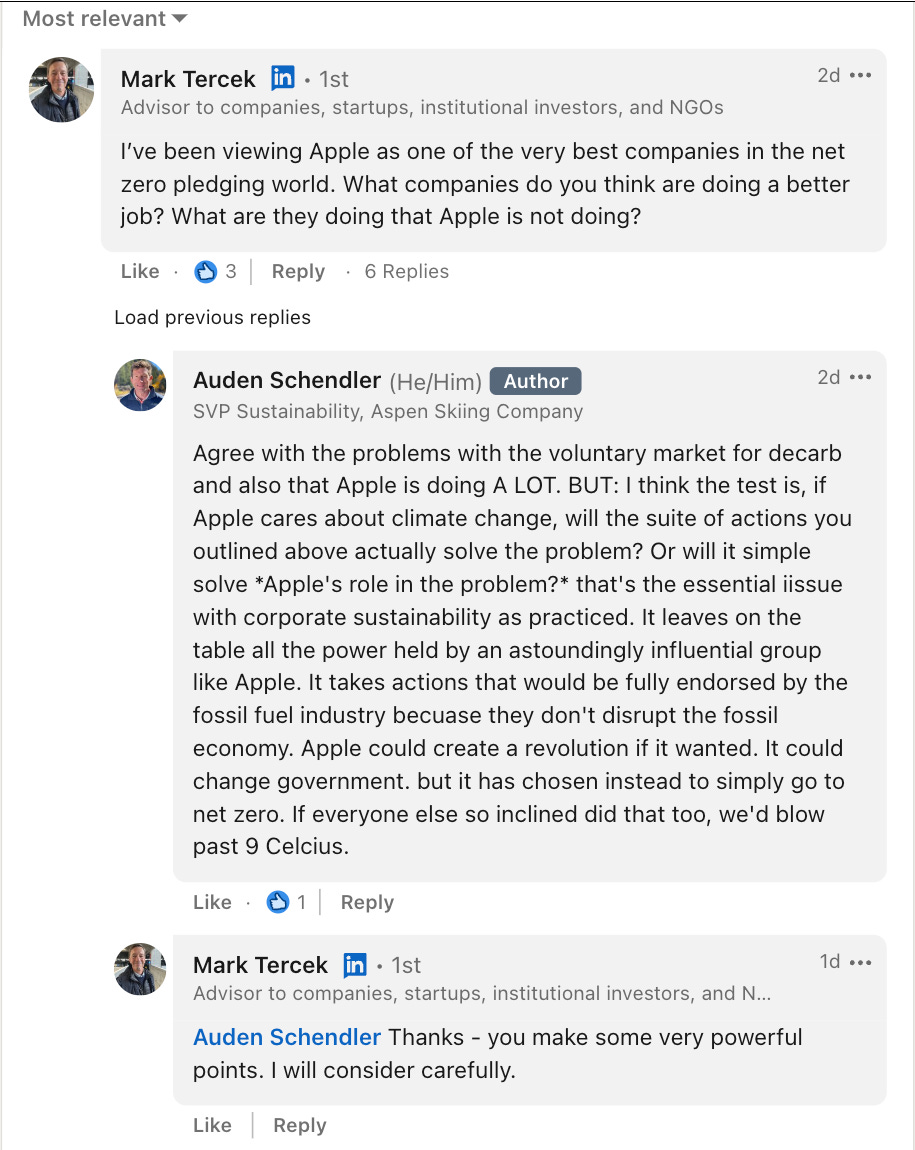How Ambitious is Apple’s Climate Program?
When is good good enough?
Apple has been making a lot of news with its climate claims lately. But how ambitious is its climate program really?
That question provoked an interesting discussion on LinkedIn last week.
The debate really boiled down to the following question: “Where exactly should we set the bar for voluntary climate action?”
Auden Schendler, a frontline environmentalist and someone I very much respect, shared an article on LinkedIn questioning Apple’s claims of climate progress. I was surprised by Auden’s critical commentary and also surprised that it had earned the concurrence of Joe Romm, a prominent climate intellectual whom I greatly respect.
My response won’t surprise diligent readers of The Instigator: I think highly of Apple and its voluntary climate commitments and said so.
Indeed, I can’t really think of any other company doing better than Apple (other than perhaps Patagonia, which is in a league of its own).
After this exchange on LinkedIn, I continued to mull the matter.
My conclusion: I still think I’m mostly right.
Consider:
Apple is committing to reach net zero by 2030. That’s only about six years from now. Imagine how much better we would all feel about the climate challenge if other corporations would make the same commitment
Apple’s disclosures about its climate goals are generally very good. Full and transparent disclosure is something we always promote here. Apple publishes a plan every year that specifies annual net-zero milestones and breaks them down into emissions reductions versus carbon removals. All net zero-pledging companies should do this.
Apple seems to be doing everything it can to help its suppliers access clean energy.
Apple is telling its suppliers to cut their emissions (because the company’s net-zero goals include scope 3 emissions). If governments won’t mandate emission reductions, huge customers like Apple doing so is the next best thing.
Of course, we’ll see in a few years whether Apple can achieve these big goals, but I have every reason to expect they will.
*****
On the other hand, I’ll also acknowledge that Apple’s critics are right about some important matters too.
We should ask a lot from companies as powerful as Apple. After all, the stakes are as high as they get, and companies like Apple have enormous power.
Here are some additional asks that I would make of Apple:
Disclose more about the company’s use of renewable energy certificates (i.e., RECs), acknowledge the shortcomings of this approach, and explain everything the company is doing to increase the supply of clean energy everywhere Apple operates.
Clarify the company’s use of carbon removal credits (which align with a net-zero strategy and which this newsletter strongly supports) vs avoided emission ones (which don’t work for net zero but are not all bad).
Explain how the company is achieving actual reductions in emissions, disclose what emission reductions cost, and identify the biggest obstacles to faster progress.
Disclose more about the company’s lobbying efforts to strengthen climate policy (i.e., regulations, mandates, tax incentives, clean energy programs) in all jurisdictions where Apple operates.
Tell us exactly how the company concludes that the Apple watch is “carbon neutral.” I don’t object to companies making claims along these lines — bold marketing likely helps strengthen corporate climate initiatives as it provides some commercial rationale. But they need to be plausible claims. The company should lay out the logic and analysis behind the carbon-neutral claim.
*****
I said most of the above on LinkedIn.
Auden’s response: Yes, Apple is doing a lot. But we need companies to do even more. We need them to create a “revolution.”
Here I think Auden goes too far. Corporations are not in the revolution business. Businesses are obliged to maximize returns for stakeholders. Asking the private sector to promote revolution is not a strategy that will scale.
Sure, some exceptional companies like Apple can likely do more and we should encourage them to do so. But climate hawks should not be too distracted by such exceptions. Our primary focus should be on corporate climate programs that all companies can pursue. Of course, this will only take us partway there. We need governmental action for all the vital needs that don’t make business sense and therefore are unlikely to be accomplished through voluntary initiatives.
*****
Now I want you know your take. What do you think we should expect corporations to do voluntarily to address the climate challenge? What actions should be mandated by regulations or incentivized by policy? What companies are doing the best job on these fronts? As always, we welcome your thoughts.




